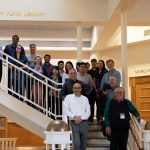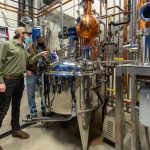URBANA, Ill. – The Integrated Bioprocessing Research Laboratory (IBRL) at the University of Illinois welcomed a group of industry professionals from around the globe for the “Revitalization of Corn Processing Facilities for the Future” short course.
The course took place over two days at the beginning of October and focused on how companies can valorize under-utilized corn processing facilities in the growing precision fermentation and bioindustrial manufacturing fields. The course welcomed 28 participants from 20 companies, as well as 10 presenters that included faculty specialists from the College of Agricultural, Consumer and Environmental Sciences (ACES) and industry representatives.
“This course is designed to help corn-processing companies think about impactful ways to use their pre-existing equipment for new opportunities,” explains IBRL Executive Director Vijay Singh. “The Midwest agricultural system invested heavily in equipment and infrastructure to support both the ethanol and high fructose corn syrup industries. As both of those markets lose consumer traction and corn yields continue to increase, revitalizing facilities and developing new uses for corn is crucial to the Midwest’s economy.”
Course presentations ranged from dry grind ethanol and wet milling to potential partnerships for existing corn processing facilities. Brian Jacobson, associate director of strategic operations, gave an in-depth tour of IBRL and equipment capacity, providing a look at some of the described new technologies. Participants also had the opportunity to speak with Jacobson and other IBRL experts regarding the equipment needed to support corn-based industries, services IBRL offers for running pilot trials and, and training opportunities.
Following the tour, local brewery Riggs Beer Company hosted participants for a networking reception that included research poster presentations from nine graduate students from the Center for Advanced Bioenergy and Bioproducts Innovation (CABBI). A representative from CABBI’s RISE summer internship program also presented on industry sponsorship and engagement opportunities. The RISE program focuses on internships in sustainable bioenergy for groups that are currently underrepresented in STEM.
Course participants included professionals from a variety of companies with different specializations, and their motivations for attending were just as far-reaching. Russ Zeeck, Chief Operating Officer at AgVault,LLC, has 30 years of experience in agricultural processing facilities and was excited to network with industry professionals and hear the latest technological trends. Zeeck was impressed not only by the short course, but also by IBRL’s equipment capabilities and knowledgeable staff. He found the honest discussion and straightforward approach to discussing the struggling ethanol industry beneficial to participants and more realistic than other industry conferences.
Another participant, Binita Bhattacharjee, Vice President of Process Development and Engineering at New Culture Foods reflected, “For someone that is mostly focused on scaling precision fermentation applications, IBRL’s workshop provided an excellent opportunity to better understand the economic advantages of locating precision fermentation facilities near dry grind operators, the technical considerations behind maximizing re-use of existing infrastructure, and the key engineering companies in this space. Thanks, IBRL, for an efficient, accessible and well-paced workshop!”
In an effort to continue to engage industry and educate the workforce, IBRL plans to host a three-day short course in March titled “Fermentation and the Art of Scaling Up.” This course will explore the growing bioindustrial fermentation industry as it relates to products like food, fibers, plastics, and cosmetics, while giving participants the opportunity to receive hands-on training with pilot-scale fermentation equipment. For more information, please visit https://ibrl.aces.illinois.edu/fermentation-short-course/










